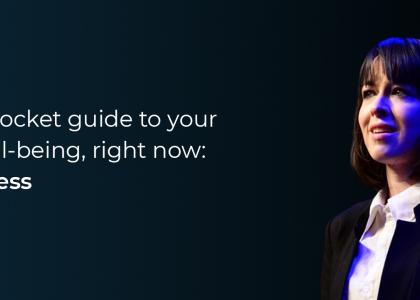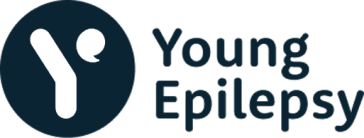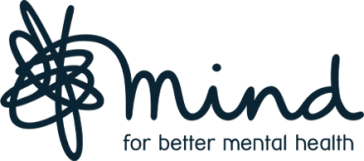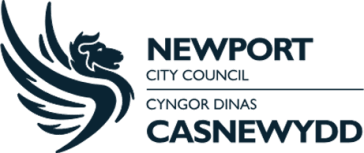1 April 2021
A pocket guide to your wellbeing, right now: Stress

In the second of our three-part blog series, Katherine Templar Lewis looks at the three sometimes overlooked and often out of our control factors that impact our wellbeing in times of crisis: Isolation, Stress, and Uncertainty. In this blog, she focuses on stress.
In this series, I have been looking at the effects of the pandemic on our brains and bodies. In the first blog, we looked at isolation. But that is one feature of this crisis that will in time diminish. So in this second post, I want to focus on stress. It has been a long year of high stress, and when we start to return to work, the stress will not be over. As we venture back out into a seemingly less safe world, to recalibrate, stress and anxiety levels may well even go up for a time.
So let’s talk about stress.
Of course, we know we are stressed, there is, as mentioned, a global pandemic happening. But we all too easily quickly answer the question ‘how are you’ with, ‘I’m fine'. But we are all suffering long-term stress. We couldn’t not be. However, by better understanding what stress does to our brains, we can better know how to reset, recharge, and build the resilience we need as we head forward when the world reopens.
Your brain on stress
Stress is exhausting. “Pandemic fatigue,” “mental fog,” “work/life blur,” all these words we are using with surprise. Yes, your brain is foggy and it is tired.
When we are stressed, we release a series of hormones including cortisol and adrenaline. They pump up our body ready to run or fight, an evolutionary response, useful when threats are immediate and physical. A tiger attack, a snake, a falling rock. We get a short burst of energy after which you rest and reset. Using, reacting, and then metabolising these chemicals takes a huge amount of energy. We have been on high alert for a long time. That is why we are very tired. And always hungry.
What’s more, these chemicals negatively affect memory systems such as the hippocampus. We experience genuine forgetfulness. Cognitive interference occurs, as our attention, a limited resource is being used to cope with the stress. We have less capacity to think and less able to think clearly.
This maladaptive response to long-term stress can even be seen in the way the brain is working. Our amygdala, the emotional part of the brain in an emergency goes into overdrive. Normally our pre-frontal cortex, the lofty rational part, puts the brakes on when the emotional parts get overwhelmed. In emergencies, this doesn’t happen and the amygdala takes the driver’s seat. It’s not only exhausting but it also likes to play safe. In situations that may compromise your survival, the brain would rather be overcautious and wrong. Rumors, fake news, and anomalous stories gain credibility. You go into default negative bias mode and rather than be more innovative, we start to prepare for the worst-case and become less so. Even our creativity starts to go down.
Counteracting Stress
This sounds pretty dire. But the fact is we have a whole toolkit that can help counteract these chemicals and brain states clearing our brains and unlocking our creativity.
1. Prioritise digital connection
Because humans are wired for social connections being around others releases oxytocin a feel-good hormone that combats stress and reduces cortisol. So, prioritise connection. Smile at strangers in the park, call a friend, connect, connect. Even if it's digitally, a zoom, or a digital online experience. Even digital connection can elicit the release of oxytocin which makes us feel better and allows our brains to work better.
2. Take Breaks
The quarantine can become monotonous. We are now recognising the reality of zoom fatigue, where the constant shifting of your eyes starts to have a negative effect on your productivity. And then there is screen apnoea, where constant screen time is disrupting our breathing patterns. Be sure to take breaks, so your brain and body can recharge.
3. Create transitions
We have lost the commute. As hated as it was, the physical transition back home allowed for our brain to psychologically switch off without it we often can’t properly switch off and our brains keep whirring. Create an actual transition ritual at the end of the day, a walk around the house, change your clothes, make a drink to celebrate the end of the workday.
4. Move more
The trouble you are having keeping track of what day it is, or the conversation you just had is real. Our memory is being impacted as our surroundings and circumstances are staying so static. You can enhance your memory and learn with movement. Stretch or walk through your neighborhood, movement actively contributes to your cognitive function. And that's on top of boosting your immune system and the other amazing benefits of the exercise we all know.
5. Limit Blue Light
During the coronavirus crisis, chances are you’re more tied to your screen than ever. Blue light changes chemicals in your eyes so that when you go to bed you think its dawn and your body wakes up. Blue light can negatively impact sleep and circadian rhythms and, in turn, have negative effects on your physical, emotional, and cognitive health. Manage your screen time and limit your exposure to blue light. Change settings, or get filter glasses.
6. Get Outside
I know the pain of ‘going for another walk’ but do it. Spend time in nature if you can. The outdoors is also critical to your brain health. Humans function best when they have access to and connection with nature. Not only does natural light and greenery reduce stress, improve health and increase productivity, but it can also do something called Attention Restoration. It restores your concentration, focus, and calm.
7. Do things
In fact, do anything. Whether it really is making banana bread or knitting socks. We are not good with boredom. In fact, boredom and waiting time are perceived as more stressful than actual combat. In the study “The Challenges of the Disengaged Mind,” people were ordered to sit in a room and do nothing. They chose to give themselves electric shocks rather than pass the time in silence. Apathy is dragging, the more you do, the more energy you have and the more your brain engages.
Building resilience
These are extreme times. We must be kind to ourselves. Our brains and bodies are evolved to deal with attacking predators, not pandemics. Our nervous system, brain, and stress response are brilliant when short-lived. Activated over time it fatigues us and has a negative effect on how we feel and how we work. But, by understanding what is happening to us at a neural level and prioritising simple tasks to help counteract these effects we can reset, recharge and over time build new habits and resilience that will help us face the transition back with our whole selves and brains present, activated and ready to innovate.




































































